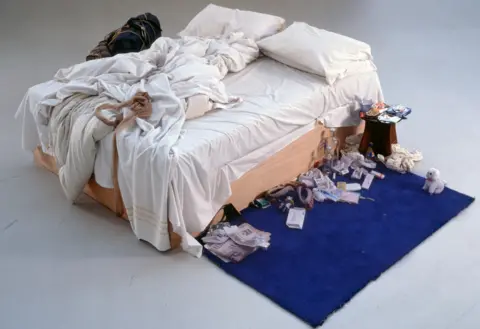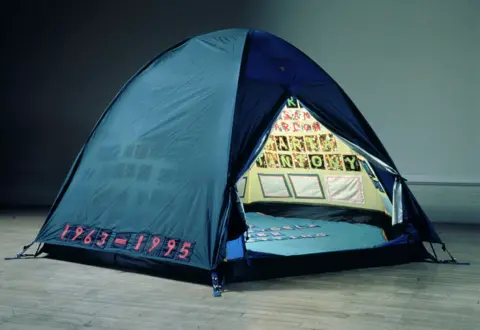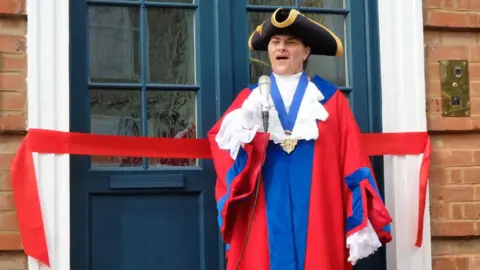[ad_1]
 PA Media
PA MediaTracey Emin has been honoured with a damehood for services to British art, and has also revealed to the BBC that she has just been given the four-year “all clear” from cancer.
Emin, one of Britain’s most acclaimed artists, was diagnosed with serious bladder cancer in 2020 and underwent major surgery.
She says she didn’t think she’d still be alive now, “let alone sitting here and becoming a dame”.
“When you’ve had cancer to the level that I had, where you really think you’re probably going to die and you’re looking at months ahead of you to live – and then suddenly everything turns around, it’s like being born again and life starts again and all these really amazing things happen.”
 Harry Weller
Harry WellerWe meet in the studio at her imposing central London home in a Georgian square in Bloomsbury.
We’re surrounded by her paintings, some propped up on stools. The drips of white, red and blue paint on the parquet floor below them are evidence of Emin’s style.
“I’m quite aggressive with the paint and my movements and my strokes and everything,” she says.
The damehood, revealed in the King’s Birthday Honours on Friday, was entirely unexpected, she says.
She had already been appointed CBE in 2012, but “Dame Tracey”, she laughs, “has a ring about it”.
“It’s really cool,” she says. “I don’t think there’s ever been one before.”
She might not have become Dame Tracey if she hadn’t been alerted to a letter marked “urgent” sitting unopened at her former studio.
She tells us she spent a day at a Buckingham Palace garden party, where she found herself shaking hands with the King and Queen.
“I was thinking, this is a bit weird. I’m kind of up the top here. I wonder why.”
It was only on her way home that she received the call about the letter. I get the feeling she hasn’t stopped smiling since.
 Tracey Emin
Tracey EminEmin rose to fame alongside the likes of Damien Hirst and Sarah Lucas as one of the YBAs. The Young British Artists, labelled in the late 1980s, were known for their openness to different material and processes, their shock tactics and their entrepreneurial spirit.
She had left school at 13, and has previously talked of being abused as a child and raped at that age. She tells me she only returned to education “by law” at 15 and only until she was legally allowed to leave. She spent most of her time in the art department.
Emin only ever wanted to be an artist. The art teachers encouraged her. A while back, she actually bumped into one, Mrs Morris, in Marks and Spencer. “She was 86 then, and she was so proud of me and it was so sweet.”
Emin has always made deeply personal work. My Bed, her groundbreaking 1999 Turner Prize installation, was a dishevelled double bed surrounded by overflowing ashtrays, used condoms and empty vodka bottles.
But whether it was that depiction of a period in her life when she was at a low ebb, drinking too much and eating too little; or a neon sign proclaiming “I could have really loved you”; or any one of her visceral paintings, Emin has always poured her emotions, her experiences and her trauma into her art.
 Tracey Emin
Tracey EminShe describes art to me as having “many rooms”. Her room “is emotional and it’s about feelings, and it’s supposed to work like a magnet to attract other people, their emotions and their feelings”.
Everyone I Have Ever Slept With 1963-1995 – the dates were the years she had been alive at that point – was another autobiographical work from the early days.
Inside a tent, Emin had appliquéd 102 names. The work’s title suggested sexual encounters, but she also listed people she had spent more innocent nights with during her life, including her twin brother Paul. Poignantly, she also mentioned the two foetuses from an abortion a few years before.
Making taboo subjects open
Emin tells me her art isn’t just about her, but is a filter for others.
“My art is a place where people can expose themselves by looking at it, and they can feel their own feelings and their own emotions.”
Looking back, she says: “I was making art about rape, abortion, teenage sex abuse – many, many taboo subjects. And I was making those subjects open and available for discussion, which can only be a good, healthy thing.”
This was a long time before the MeToo movement.
The media and some critics often dismissed Emin and her work, also commenting negatively on her appearance and accent. The press treated her “quite diabolically” she says.
She became a celebrity – but didn’t play the game. She was outspoken, she drank and sometimes swore.
She gave up alcohol in 2020. Now about to be 61, she tells me, more than the drinking, she regrets the smoking and the fact she didn’t look after her health.
 Tracey Emin
Tracey EminShe documented her cancer journey on Instagram, with treatment including having her bladder and other organs in her pelvis removed during lockdown.
Sitting with her now, she looks a picture of health.
“Being made a dame is, to me, something to be really happy about and celebrate because it’s another marker on my life,” she says.
It also means she’s now “100%” part of the establishment, even though she says she hasn’t been “the best role model”.
“I haven’t tried to be a goody goody and I haven’t tried to do the right things. I’ve lived my life how I want to live.”
She says being made a dame is a sign that attitudes are changing and there are different ways of recognising what is positive or good. “I really appreciate that.”
She’s already been made a freewoman of Margate (“they gave me the keys of the town, it was so lovely”).
 Getty Images
Getty ImagesEmin mainly lives in the Kent seaside town, where she grew up and has created the Tracey Emin Artist Residency (TEAR). She came up with the idea as she was recovering from her operation. She’s converted the old public baths into artists’ studios, which 10 students get rent-free for 18 months.
Creating art is a “lonely” pursuit, but she also wants to discuss art as much as she can. Hence TEAR. “I decided to have more art around me. That was a bit selfish really.”
She’s being self-effacing. The project is the latest way she is using her voice to champion what she believes in and the importance of backing creativity financially.
‘People like me don’t become dames’
The art world is changing, but she believes it is “a man’s world really”, particularly painting. “All the great female painters were wiped out of history. Well, now they’re coming back.”
She hopes her generation of female artists have had a role in making that happen, in focusing on the lost women artists of the past and changing “that perception of what art is”.
One reason she accepted the damehood is because “it gives me a louder voice to do the things that I think are important”.
“Not for a second” did she think about saying no. “I just thought, wow”.
“People like me don’t become dames, unless you’re a sportsperson,” she says.
There is nothing like a dame, as the song goes. And there is certainly nobody like Dame Tracey Emin.
She’s an artist who has never compromised, and who has unflinchingly bared her soul through her art. And she’s an examiner of her own life, who has helped the rest of us understand more about our own lives.
[ad_2]
Source link freeslots dinogame telegram营销




